Interview: Exploring The Weird Worlds of Al Ewing
I want to preface this interview with an apology to Al Ewing, and the fine folks at Abaddon Books. This interview was actually conducted way back in April 2010, but for various reasons it’s taken me seven months to post it. Basically, at first, I wanted to push the post live to coincide with the release of Al’s latest novel, then the release was delayed for a while, so I thought I’d wait to post it until then. Then the US release of Gods of Manhattan came and went, and I guess I sort of forgot that I had this interview ready to go. Well, I wouldn’t say forgot, but I had a bad year last year, and to tell you the truth, I gave up caring about the site, comics, and pretty much life itself. I don’t want to drag you down with personal crap, but I went through some pretty dark times, and lots of stuff got neglected.
Then, I happened to see that Gods of Manhattan was released in the UK last week, so I thought, you know what, I should dust of that Al Ewing interview I did, and put it up on the site. So, here it is, finally! Once again, my humble apologies to Al, and also to Jenni Hill at Rebellion, who put me in contact with Al in the first place. I feel so guilty for sitting on this for so long!
————————————————-
Al Ewing is a British writer of comics and prose, who is likely best know for his work in 2000 AD. Al started out in the British small press scene, writing for publications like Solar Wind, FutureQuake, Dogbreath, Zarjaz, and The End Is Nigh. His first work in 2000 AD was writing Future Shocks, and the occasional Judge Dredd strip; however, his big break was in 2008, when he wrote the story
 Dead Signal, which was illustrated by PJ Holden, and published in 2000 AD #1581-1587. Since then, Al has contributed several much loved strips to the pages of 2000 AD and Judge Dredd Megazine, including Damnation Station, Tempest, and the infamous Zombo
Dead Signal, which was illustrated by PJ Holden, and published in 2000 AD #1581-1587. Since then, Al has contributed several much loved strips to the pages of 2000 AD and Judge Dredd Megazine, including Damnation Station, Tempest, and the infamous Zombo![]() . In addition, he has become one of the most popular new writers of Judge Dredd, and has contributed dozens of fantastic stories to the progs over the last couple of years.
. In addition, he has become one of the most popular new writers of Judge Dredd, and has contributed dozens of fantastic stories to the progs over the last couple of years.
Something that fans of Ewing’s comic work may not be aware of is that he’s a also a prolific writer of prose, and has had four novels published, through 2000 AD‘s sister company, Abaddon Books. With Al’s latest novel in the works (at the time of interview), I thought it would be a good idea to catch up with the writer, and find out a bit about his creative process, and how he strikes the balance between writing comic and prose.
Comics Vs. Novels
- You are known primarily as a writer of comic books. Have you always had a desire to write prose, or is this something that came after you began writing comics?
AE: It’s something that came after comics, about when I realised comics alone was not at that time going to pay the bills. It still wouldn’t - I need the yearly novel to pay the rent. Prose is something I enjoy experimenting with, but it’s vastly more difficult and something that I really sweat and strain over, and I’d never have thought of myself as any good at it until I just threw myself into the process - even now, I have a bad tendency to experiment on the page, the most recent example being that Marmite moment when I write myself into Death Got No Mercy to be threatened by the main character. I still have no idea whether that was a semi-decent idea or a wanky load of old solipsistic bollocks, though in the cold light of day I suspect the latter. (Still, some people seem to love it, so fair play to me I suppose.)
- When you come up with a new story idea, how do you decide whether the story would better be realized as a comic, or a novel?
AE: Most ideas I have are visual, and thus make better comics than books. Book-specific ideas only come when I’m asked for them, or when I think to myself that I need to come up with a book idea. The functionality follows the form.
- Have you written any comic stories that in retrospect, you think would have been better as a novel, or vice versa?
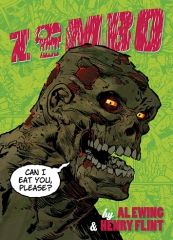 AE: One did become a novel! I, Zombie started life in my head as a comics project about an unkillable bounty hunter. All the twists and turns in the book would have taken place over about four serieses of it - and planning four serieses of anything when you’re still writing Future Shocks is a rookie mistake, which is why it never saw the light of day until Jon Oliver asked about the possibility of me doing a second novel for Abaddon. I took The Bountyman (dreadful title) and forced every twist and turn kicking and screaming into around 85,000 words of text, and I, Zombie was born.
AE: One did become a novel! I, Zombie started life in my head as a comics project about an unkillable bounty hunter. All the twists and turns in the book would have taken place over about four serieses of it - and planning four serieses of anything when you’re still writing Future Shocks is a rookie mistake, which is why it never saw the light of day until Jon Oliver asked about the possibility of me doing a second novel for Abaddon. I took The Bountyman (dreadful title) and forced every twist and turn kicking and screaming into around 85,000 words of text, and I, Zombie was born.
- How do you balance writing both comics and prose? What differs in your approach to writing for these different media?
AE: Timescale. I have a lot longer to write a novel than I do to write a comic, which is good because it takes longer, and I can’t leave it until the last minute, although I increasingly try to.
- Have you ever considered a project that would cross-over between your comic work and novel work? Say, a novel which had a comic spin-off or vice versa?
AE: I once had the mad idea that El Sombra would turn up in Tempest, since they’re essentially the same character on different sides of right and wrong - martial artists whose insanity takes their self-taught skills to a higher level than they could achieve if they were sane. For about five minutes Tempest was going to be El Sombra, but that idea never made it out of the shower cubicle, thank God. As it is, El Sombra will be making a triumphant comeback in the pages of Gods Of Manhattan.
The Creative Process
- How does your creative process work? Are you working on several novels at once, or do the ideas come to you one at a time?
AE: I can only really work on one thing at one time, as I’ve learned to my cost. That does mean that I can jump to another thing when I get blocked, but I’m generally blocked on the other thing as well for at least a half hour. But generally, if I’m asked to do something prose-y for a sooner deadline, it’ll get in the way of the prose-y thing I was doing before.
- How would you describe your writing style?
AE: Seat of the pants. If it feels good, do it. Immediate. Not much time for description - description can be like pulling teeth, so I tend to suggest rather than render. Dialogue is very important. Emotion is very important - things have to be emotionally real, because that’s the only reality fiction can have. I need to grab you by the heart first, the balls second, the mind third and any other body parts are gravy. A brief side note about emotional reality - it really, really bugs me that people are still making excuses for why they can’t do stories about magic. (I’m thinking Doctor Strange here.) “Magic has no rules,” blah blah blah. Magic has rules, even when it has no rules, because the rules of magic and the rules of story are the same thing. And guess what? They’re also the rules of emotion. Everyone wants something. Everyone is the hero of their own life. Everything has a cost. And a few others.
- What writers influence your style?
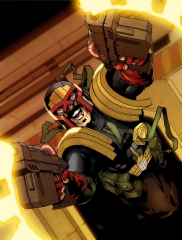 AE: Jack Kirby. The most underrated writer in comics. At best a guilty pleasure, at worst… well, we’ve all heard the denigrations. ‘Clunky’, ‘awkward’, ‘goofy’, they were practically spitting on him in the seventies - because comics critics back then were incredibly fucking stupid and didn’t know what they had when they had it. Well, he’s not a guilty pleasure for me. The man was a genius, a poet, an explorer of “cosmic truths” that fired an “atom charge” into REALITY itself —- that could have spelt “ENLIGHTENMENT PLUS” — or a FATAL destiny —-! And he actually understood what you can do with punctuation! People treat it as an optional extra now - it drives me literally insane when a letterer changes mine around - punctuation forms the bolts and nuts and rivets that hold our thoughts together! Use it! You don’t have to be afraid! And that’s not even touching his themes and metaphors and the way he made his prose as kinetic and punchy as his images. God. One of the most intensely brilliant writers of his generation. Ahead of his time, ahead of our time, ahead of all times.
AE: Jack Kirby. The most underrated writer in comics. At best a guilty pleasure, at worst… well, we’ve all heard the denigrations. ‘Clunky’, ‘awkward’, ‘goofy’, they were practically spitting on him in the seventies - because comics critics back then were incredibly fucking stupid and didn’t know what they had when they had it. Well, he’s not a guilty pleasure for me. The man was a genius, a poet, an explorer of “cosmic truths” that fired an “atom charge” into REALITY itself —- that could have spelt “ENLIGHTENMENT PLUS” — or a FATAL destiny —-! And he actually understood what you can do with punctuation! People treat it as an optional extra now - it drives me literally insane when a letterer changes mine around - punctuation forms the bolts and nuts and rivets that hold our thoughts together! Use it! You don’t have to be afraid! And that’s not even touching his themes and metaphors and the way he made his prose as kinetic and punchy as his images. God. One of the most intensely brilliant writers of his generation. Ahead of his time, ahead of our time, ahead of all times.
So yeah, Kirby. Apart from that, in no order… Pat Mills, obviously. John Wagner, obviously. Grant Morrison, obviously. Will Eisner, obviously. Richard Stark. Philip K Dick. Jon Savage. Alan Moore. Eddie Campbell. My brother, top music critic Tom Ewing. The Golden Apples Of The Sun. Kieron Gillen. (Phonogram put him up there with the Gods as far as I’m concerned, but don’t tell him I said that.) Andy Diggle, through conversations in bars at three in the morning as well as his work. Neil Tennant. Mort Weisinger. Stewart Lee. Richard Herring. Gerhardt Schnobble. Geoffrey Willans and Ronald Searle. Graham Linehan and Arthur Matthews. Keith Giffen and Robert Loren Fleming. Kylie Minogue. John Willie. Dan Savage. Stan Lee. Steve Ditko. Peter Milligan. Ray Bradbury. Bob Haney. Julie Schwartz. Superman’s Return To Krypton. Jim Shooter. John Wyndham. James Heller. Harry Harrison. John Peel. Isaac Asimov. Denny O’Neill. Zirn Left Unguarded, The Jenghik Palace In Flames, John Westerley Dead. Peter B Gillis - nobody ever talks about Peter B Gillis anymore. Another forgotten genius. If I ever manage to do anything in American comics, it’ll be getting them to remember Peter B Gillis. Google him, read his comics - “how did I live so long before this moment?”
The Worlds of Abaddon
- How did you first become involved with Abaddon Books? I know that Abaddon are an imprint of Rebellion (publisher of 2000 AD and Judge Dredd Megazine), so did they approach you, based on your previous work?
AE: Nearly. I somehow became aware that they were looking for new writers - whether they told me or I heard it through the grapevine, I forget, my memory is hazy - so I asked for some world bibles, picked Steampunk (after a brief dabble with Fantasy that I’ll explain later) and set about crafting something. It got accepted, I think because of the giant Hitler robot, though I had to tone down the kink elements - there were a lot of kink elements in El Sombra. The workers had a ‘human clock’ who was a leatherboy who’d push the button to sound the end-of-shift horn with his tongue whenever he was whipped. Jon Oliver felt that might frighten the yanks a little.
- Abaddon are quite a unique publisher, in that the novels they publish are often set within a shared universe, for example, ‘The Afterblight Chronicles’ are a line of novels, which are all set within a shared post-apocalyptic world. When you come up with a new story, are there certain guidelines that you have to stick to in order to make them fit within the confines of these shared worlds?
AE: Kind of - the histories of these worlds are set in stone to a certain extent, but they can be added to. I don’t do as much research as I should - what I tend to do is grab parts of the universe that haven’t been ‘claimed’ and build on those with a free hand. In El Sombra, I took a small piece of Mexico and Nazi Germany, and in Gods Of Manhattan I grab hold of North America, particularly New York. America has gone very differently to Britain. It’s not Victorian - it’s a little bit twenties, a little bit seventies, a little bit… something else.
- Is there any crossover between books set in the same worlds? For example, if there is a significant event depicted in a ‘Pax Brittania’ novel, will the subsequent books in this series touch upon that event at all, or are the novels completely stand-alone?
AE: There can be - I’d love it if Cade turned up in, say, the School’s Out plotline, for example. Apparently by putting that two years after the disease I made it one of the chronological earliest stories, according to a conversation I had somewhere with someone, so by ‘now’ he could be anywhere… it’d be nice to see someone else kill him off. Is that weird? Might be a lot of work. At one point I was planning on talking to Jon about an El Sombra/Ulysses Quicksilver crossover, but then I realised how much work it would be for the two of us, merging our writing styles (and practices) into one thing. He’s got kids, he doesn’t need to be jumping off the deadline cliff the way I do.
- If you come up with an idea that doesn’t fit within any of the pre-defined Abaddon worlds, are they open to publishing a stand-alone novel for you, or perhaps creating a new world, based upon the one depicted in said story?
AE: Already on it. Once I’m done and dusted with Gods Of Manhattan, I’ve got some ideas for the Solaris imprint, but being only able to think about one thing at once means that I’m full-cylinders on ‘Gods’ right now, to the exclusion of all else except the occasional Dredd.
El Sombra
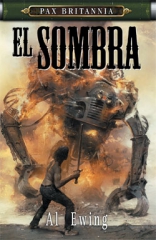 Al’s first first novel novel for Abaddon was El Sombra (buy on Amazon.com
Al’s first first novel novel for Abaddon was El Sombra (buy on Amazon.com![]() ), a story set within the Steampunk inspired ‘Pax Britania‘ universe. The novel is set in Mexico, and features the Luftwaffe, who on their steam-driven wings, have torn apart the sleepy town of Pasito in the heart of Mexico, only to rebuild it as a terrifying clockwork-town where the people become human robots, furthering the nightmare dreams of Der Fuhrer.
), a story set within the Steampunk inspired ‘Pax Britania‘ universe. The novel is set in Mexico, and features the Luftwaffe, who on their steam-driven wings, have torn apart the sleepy town of Pasito in the heart of Mexico, only to rebuild it as a terrifying clockwork-town where the people become human robots, furthering the nightmare dreams of Der Fuhrer.
- That’s a pretty ambitious concept for a first novel. Where on earth did you come up with the idea?
AE: Write what you know! There’s an awful lot of black sludge dredged up from the base of my id in there if you know where to look. All that stuff about a repressed, emo crybaby reinventing himself as a hairy, joyful exhibitionist and being tortured using shame gas - it’s practically a starter manual for my next psychotherapist. Don’t read it! Okay, do. (I’m much better now.)
Originally I was going to write a fantasy novel, with a lone barbarian versus a winged ruling elite. I had a great idea for a big aerie, where the winged ones would have their parliament - then I got a look at the fantasy universe, which I think at the time was Dreams Of Inaan, and it blatantly wouldn’t fit. So! Let’s make it Steampunk, make it winged Nazis - ooh, I can make some hay with cavorite and the ‘nth metal’ of Hawkman! Apparently cavorite isn’t a metal but I didn’t find that out until later. Oh well. Let’s chuck some Prisoner in there, make it a creepy Village set-up - hey, let’s have one guy for Reward and one guy for Punishment! And the Punishment guy can have a secret torture chamber underground filled with shame gas! If we’re going Prisoner, let’s bring in Alexis Kanner as a hot, half-naked bisexual sadist. We’ll have him whipping people in the public square - better run that past Jon, he might make me make it less sexy. I’ll make him really evil and really well turned out, too, that’ll show those fuckers in the office with their ‘dress code’. Sometimes shirts are evil! Oooh, wait! I’ve got to throw a stop-the-wedding scene into this! Hey, if we’re doing STOP THE WEDDING we need Zorro involved, etc, etc, etc, etc, etc… Yes, I admit it, I bolted together a hundred completely different bits of pop culture and then resprayed them. Is that bad? It grew into something that was mine, and it was my first effort anyway. You can’t see the joins.
- Are you a big fan of the Steampunk genre? If so, what writers and works are your favourites?
AE: Honourable mention to Jon Green and his excellent Ulysses Quicksilver here. Apart from that, the big man on campus is Bryan Talbot, with Luther Arkwright and the recent Grandville - beautiful, wonderful things! I suppose my main problem with Steampunk is the Victorian thing - yes, corsets, but apart from that it’s a little limiting. I want to keep the best of the stereotype steam-copper-leather ethos and mix it with other ‘alternate history’ periods - in Gods Of Manhattan you have the punk explosion going on, you have a form of breakdancing, zoot suits, Andy Warhol, Factory, steam-powered cars, Manga, BMX bikes and so on and so on and so on. Mix it all up. The only rule is no electricity, and even then I slip some in - it’s just not used or understood the way we use or understand it.
I, Zombie
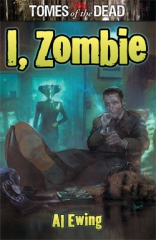 Al’s followed El Sombra up with I, Zombie (buy on Amazon.com
Al’s followed El Sombra up with I, Zombie (buy on Amazon.com![]() ), a ‘Tomes of the Dead‘ novel. The ‘Tomes of the Dead’ are unique amongst Abaddon’s line-up, in that stories are not set in a single shared world, but instead consist of a series of stand-alone zombie stories marked by subversion or reinterpretation of the genre. I, Zombie is best described as being a mystery novel, featuring the misadventures of an undead gumshoe. Or, as Al describes it: “A zombie novel by someone who’s bored of zombies.”
), a ‘Tomes of the Dead‘ novel. The ‘Tomes of the Dead’ are unique amongst Abaddon’s line-up, in that stories are not set in a single shared world, but instead consist of a series of stand-alone zombie stories marked by subversion or reinterpretation of the genre. I, Zombie is best described as being a mystery novel, featuring the misadventures of an undead gumshoe. Or, as Al describes it: “A zombie novel by someone who’s bored of zombies.”
- What inspired you to take this approach to a story about the undead?
AE: I wanted to find a credible explanation for someone coming back from the dead that hadn’t been done before, and I also wanted to do a story from the zombie’s POV, and I wanted to play with narrative voice, which is why you’ve got about eight of them in that book.
I wanted to write a good zombie novel that could hold its head up with the rest of the line, but I also wanted to write an SF invasion novel that would be disguised as a zombie novel - the reader would pick it up, find himself led into a very odd place, and then the book would tear off its mask and shout “HA HA! It was ME all along!” and the reader would be trapped in this horrible story about aliens destroying the human race individually and collectively.With the occasional break for sushi and porn.
- Are you a fan of Zombie horrors? What are your favourite films/comics etc?
AE: I suppose I should plug Zombo by myself and Henry Flint, running in 2000AD. The greatest zombie film of all time is Wild Zero, a japanese effort in which the zombies are alien space zombies defeated with the awesome power of GUITAR WOLF!!!!?! The other wonderful thing I discovered recently is Zomblogalypse, a very funny series of ten-minute webisodes that can be found on YouTube or googled - it’s made by people living right in my home city of York and it’s a real gem (ED note, you can find them at http://www.zomblogalypse.com/).
- Zombie stories tend to be told as films, rather than novels. What were the major challenges you discovered when trying to bring this genre to the written page?
The same major challenge I always get with prose - I only have words. I’m a very visual person. I like visuals. Visuals are hot. But once you get into the rhythm of words, that can be quite hot too.
Death Got No Mercy
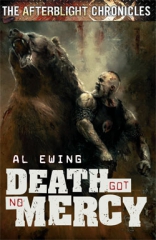 Al’s third novel was Death Got No Mercy (buy on Amazon.com
Al’s third novel was Death Got No Mercy (buy on Amazon.com![]() ), a story set within the post-apocalyptic shared universe of ‘The Afterblight Chronicles‘. Death got no Mercy tells the story of a man fighting his way across a war-torn post-apocalyptic landscape in order to get to San Francisco, and save the one person he cares about.
), a story set within the post-apocalyptic shared universe of ‘The Afterblight Chronicles‘. Death got no Mercy tells the story of a man fighting his way across a war-torn post-apocalyptic landscape in order to get to San Francisco, and save the one person he cares about.
- What was your inspiration for this story?
AE: I wanted to write THE MOST VIOLENT BOOK EVER. That was my mission statement - violence, violence, violence! And also MILFs.
I’ve got to write a post-apocalypse story. Let’s have one hard bastard fuck up a whole city! Maybe he can play one side against the other like in that film. You’ve got to have some religious nuts, but let’s have some hippies too. We need cannibals like in The Tower King! He needs to punch a bear… etc etc etc. It came together quickly. One thing that was there early on was me wanting to have the hero meet God, and I figured I should stand in. If I had it all to do again I probably wouldn’t do it, but some people like it, so I’m glad I did. (Generally people either like the Scooby Gang and hate the God Bit or vice versa. I think looking back I’m a Scooby Gang person myself.)
- The post-apocalyptic survival story is one that has been retold countless times over the years. What makes this story stand out from the genre, and how did you approach the tale, in order to give it an original spin?
AE: I ran at it screaming and hoped it blinked. I guess it’s quite ‘of its time’ - the Iraq war gets a look in, the financial crisis, gay marriage, religious wingnuttery, legal highs… and obviously we’re staring down the barrel of the apocalypse now more than ever, not because it’s any more likely (though it kind of is) but because we have so much more cool stuff to get taken away from us. What makes it ‘stand out’, though… it’s INSANELY VIOLENT, that’s what.
Gods of Manhattan
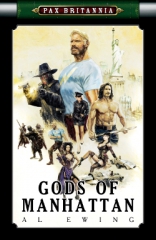 With his latest novel Gods of Manhattan (buy on Amazon.com
With his latest novel Gods of Manhattan (buy on Amazon.com![]() ), Al returns to the world of ‘Pax Britannia‘ to follow the continuing adventures of masked swordman, El Sombra, as he visits the ruins of New York city, on a mission of revenge that will take him all the way into the heart of the city’s corrupt underworld.
), Al returns to the world of ‘Pax Britannia‘ to follow the continuing adventures of masked swordman, El Sombra, as he visits the ruins of New York city, on a mission of revenge that will take him all the way into the heart of the city’s corrupt underworld.
- Without spoiling the book for anyone, what can you tell us about this latest novel?
AE: It’s a clash of the Titans between El Sombra, Doc Thunder - a super-scientist muscleman - and the Blood Spider, a dark avenger of the night. Only things aren’t what they seem.
El Sombra’s back, although he’s taking a back seat this time to a couple of other manifestations of my psyche. Close readers will be fascinated as they pore over the pages trying to find out exactly what sort of deviant I’ve become in the intervening years.
- What is your inspiration for the story?
AE: The old pulps! Doc Savage. The Shadow. Zorro (of course). Spider-Man. Superman. Jimmy Olsen. Allen Quatermain. The Faber Book Of Pop. Betty Page. Blow-Up. The Spirit. The Avenger. Captain America. Andy Warhol. Johnny Rotten. Joe McCarthy. Steve Englehart. Elliott S! Maggin.
The Future (Shock)
- Are you currently working on any future novel and comic ideas that you are allowed to talk about?
AE: I don’t know about ‘allowed’… but I’m keeping schtum. Just today I got offered a real plum that’ll see me writing something my family - any branch of my family - MUST NEVER READ. I might even wheel out a pseudonym for that, it’ll be that perverse. We’ll see. Something for Solaris, I hope. Comic-wise… Dredd, Dredd and more Dredd, plus continuing Zombo, Damnation Station, Tempest and anything else I can fit in.
- I’ve seen you remark on Twitter that you have little interest in following a US writing career. These days, it seems quite rare for creators to stay content with the British industry, and many writers and artists seem to flock to the US industry, at the earliest possible opportunity. I believe it was Pat Mills who said that “British comics should not just be a lauchpad for American careers. They should be an end in themselves” In your opinion, what makes the British comic, and genre fiction, industry such a unique haven for creativity?
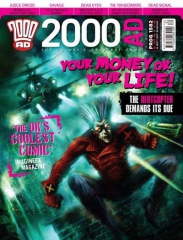 AE: Pat Mills is right! I wouldn’t mind a crack at superheroes, though. Another one, I mean. Unless you routinely pick up UK comics for eight-year-olds with free toys on the front you won’t have seen what I tend to do with superpeople, which is write them for smart eight-year-olds, and frankly I doubt I’ll get the chance to play with them that way again. And it is play, or at least it should be. I love the New Wave of American writers - Fred Van Lente is leading the charge here - who are clearly at play and loving every second. Makes for some wonderful comics.
AE: Pat Mills is right! I wouldn’t mind a crack at superheroes, though. Another one, I mean. Unless you routinely pick up UK comics for eight-year-olds with free toys on the front you won’t have seen what I tend to do with superpeople, which is write them for smart eight-year-olds, and frankly I doubt I’ll get the chance to play with them that way again. And it is play, or at least it should be. I love the New Wave of American writers - Fred Van Lente is leading the charge here - who are clearly at play and loving every second. Makes for some wonderful comics.
There’s a slight element of sour grapes here in that I do seem to keep pissing on my chips with the Americans - or on my fries, I suppose. I’ve got a bad habit of saying things out loud which should be kept quiet, and also I can’t network - or at least I can’t go into a conversation with the objective of ‘getting work’ or ‘getting noticed’. I’ve tried in the past and felt out of place, creepy like a stalker. Recently I had a final go at it and I became someone I hated for an evening. I felt unclean, a traitor to my kind, sickened by myself, foetid and shamed. All the American editors are lovely, lovely people, but in trying to please and placate them I had become a crawling, slimy thing, disgusting in my own sight. I woke up the next morning with a hangover and I cried. The lesson I learned from that was simply to Be Myself at all times, and if Myself is not an American Comic Writer Of Fame And Repute And All That Jazz… well, that’s okay. Just let me pay the rent and eat food paid for by this bizarre non-job, that’s all I want. And let me play.
- Finally, what would you say to fans of your comic work, who may not have tried your novels, to urge them to give them a try?
AE: You can read them in a day, so it’s not that much of a time investment. And you’ll get a nice kick out of them. Perfect for a train journey or a long flight. And also THEY’RE AWESOME!!!!!!!?!!
Well, I think that’s a good place to wrap up, and listen to what the man says, go and read his books! US readers, you can find all of Al’s novels, as well as the first trade of Zombo availble to order from Amazon.com![]() (also, I get a couple of cents for each referral). UK readers, I’d advise picking up the books from http://www.bookdepository.com/, I love that site!
(also, I get a couple of cents for each referral). UK readers, I’d advise picking up the books from http://www.bookdepository.com/, I love that site!
Thanks again to Al Ewing for taking the time to answer all of my questions so thoroughly, and thanks also to Jenni Hill and all the fine folks over at Abaddon Books. Check out there fantastic line-up of novels at http://www.abaddonbooks.com/
Related posts:
- Droid Interrogations: An Exclusive Interview With Dan Abnett
- An Interview With Artist PJ Holden About Garth Ennis’ Battlefields: Happy Valley, Interagents, Phonogram, and Judge Dredd!
- Droid Interrogation: An Exclusive Interview with Frazer Irving on Gutsville, Batman & Robin, Days Missing… and More!
- An Exclusive Interview with Mike Carey
- Interview: Evan Dorkin on Beasts of Burden



I’d forgotten this!
A brief note from 2011: I wouldn’t want anyone to think my bizarre punctuation fetish was anyone’s problem but my own. I’m entirely too anal about it, or I obviously was in April. Anyway, I’ve been a real pain in the arse to all letterers with the horrible layout of my scripts up until recently, so if there’s a problem with my precious, precious punctuation it’s entirely my fault. Hopefully my scripts have improved recently - I’ve been formatting with the letterer in mind after getting a couple of tips from Simon Bowland off Twitter and from Jim Campbell’s wonderful blog on the subject.
Anyway, apologies to anyone who’s ever lettered anything of mine - all the lettering jobs I’ve ever had have been ace, and I wouldn’t want anyone to think otherwise.
Also, all that warmed-over bullshit about ‘networking’ at the end is clearly me just trying to romanticise my own failures, or at least come to terms with them. I think I’ll go back in time nine months and give myself a slap.
Thanks again, Al.
If you like, If there’s anything you regret saying, I can always do an edit for you. Just let me know
Tempting! But it’s probably more honest to have all my gubbins out in the open - even these very comments, meta-fans! - rather than changing it after the fact to accomodate my ever-changing and slightly crap whims.
Thanks for the offer, though, Ed - we’ll have to have a pint next time we’re at the same convention.